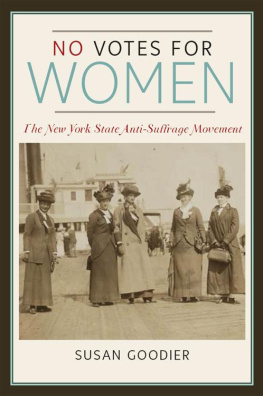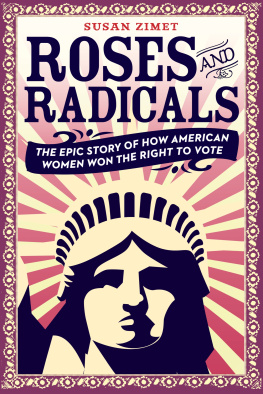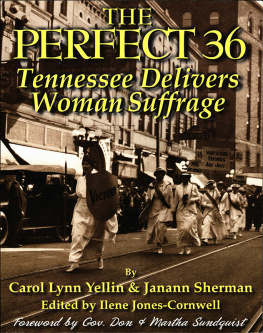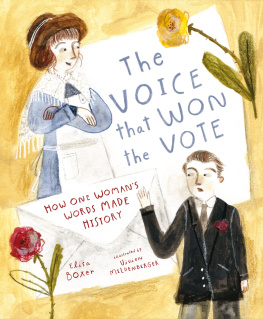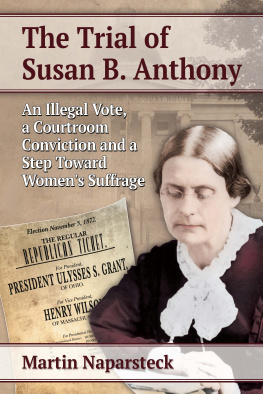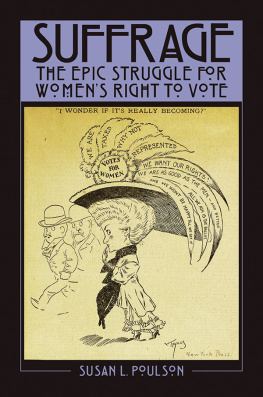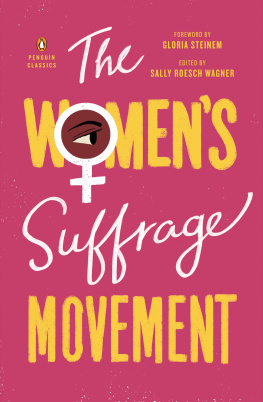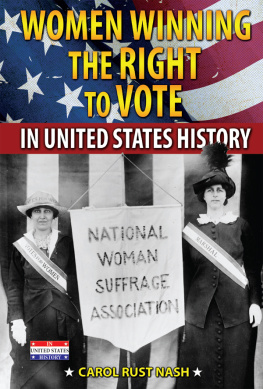Acknowledgments
We met because we are both members of the Upstate New York Womens History Organization. Its goal is to encourage and support scholarship and continuing education related to women and gender in upstate New York. We are historians of womens political and labor activism in the nineteenth and early twentieth centuries; much of our scholarship has focused on New York State. During the course of researching and writing No Votes for Women: The New York State Anti-Suffrage Movement , Susan began drafting another book on woman suffrage. Then Karen provided the impetus for this project when she suggested that we coauthor a book on the New York State movement. An early discussion with Michael McGandy of Cornell University Press encouraged us to pursue our idea of organizing the book with a focus on groups usually peripheral to the suffrage story. By also laying out the trajectory of the broader state movement, our book, we hope, will motivate the continuing recovery of stories of the many fascinating women (and men) from every hamlet, village, town, and city who devoted energy to the challenge of securing womens voting rights in the state.
Of the many womens historians who have inspired us, two in particular deserve special recognition: Sally Roesch Wagner and Judith Wellman. Generously opening her extensive research files to us, Sally motivates us with her unwavering commitment to womens and Native American history. She urges us to recognize not just the debt we owe to our activist foremothers, but to be aware of the racism and elitism that marred their movement. Similarly, we are greatly indebted to Judy for her research, writing, and mentorship. She and Ann Dexter Gordon presented at the September 2015 Upstate New York Womens History Organization conference in Seneca Falls. Although we were well along in our work by then, Judy profoundly affected us with her suggestions (might we use the word demands?) for continuing research into New York womens rights history. Her affirmation, prodding, and pleasure in our work mean a great deal to us. Scholars of womens history everywhere owe a great debt to both Sally and Judy.
Our work is, of course, further informed by those who have written on the suffrage and womens rights movements, as is clear from our bibliography. But we owe special gratitude to David Kevin McDonald, whose 1987 dissertation informed our work in many important ways. Marguerite Buckman Kearns, the granddaughter of the suffragist Edna Buckman Kearns, welcomed Susan into her home to organize and read her extensive collection of papers documenting her grandmothers suffrage activism in Rockland. In the process, Marguerite has become a valued friend and colleague. In addition, the scholars Jean Baker, Paula Baker, Nancy Cott, Anne Derousie, Ellen Carol DuBois, Laura Free, Julie Gallagher, Susan Lewis, Linda Lumsden, Sandra Moats, Grey Osterud, Carolyn Ostrander, Elisabeth Israels Perry, Shannon Risk, Randi Storch, Rosalyn Terborg-Penn, Lisa Tetrault, and Nancy Unger all have had an influence on our thinking and writing.
As always, the Rochester United States History (RUSH) draft writing group has offered valuable expertise and advice. Alison Parker, who suggested the idea of a draft writing group several years ago, has unfailingly supported our writing and research within and outside the group. In addition, Michael Brown, Tamar Carroll, Jon-Paul Dyson, Peter Eisenstadt, Carol Faulkner, Jenny Lloyd, Rachel Remmell, Mark Rice, Nancy Rosenbloom, and Suzanne Schnittmann, especially, but also other members of the group at one time or another, have helped steer this project forward, chapter by chapter. They never shy away from challenging our ideas and arguments, but they do so in nurturing and energizing ways.
Throughout the writing process, papers presented at both Upstate New York Womens History Organization and Researching New York conferences have offered more opportunities to discuss New York State woman suffrage topics. Special thanks go to Carol Faulkner and Will Walker for their valuable comments on our papers. Our audiences provocative questions when we have presented on various aspects of our research have inspired us. Talks supported by Humanities New York (formerly the New York Council of the Humanities) on woman suffrage, anti-suffrage, and black womens suffrage activism often elicited suggestions for additional places to look for answers. We both really appreciate the continuing work of members of the various chapters of the League of Women Voters, an organization descended from some of the very organizations we write about here. Right along, we have benefited from the burgeoning interest in woman suffrage on the part of many interested individuals across the state and beyond.
Colleagues and staff at our respective institutions have helped us both directly and indirectly. At Tompkins Cortland Community College, Lolly Carpenter, Bev Carey, Kathleen Boyd, John Conners, Carl Penziul, Rochelle Mike, Susan Cerretani, Kathy McDonough, Jeanne Cameron, Tina Stavenhagen-Helgren, Dave Flaten, and other members of the social sciences department often expressed interest in our work. Librarian Margaret Anderson consistently welcomed our most challenging research questions. She eagerly unearths the most obscure information! We also relied on the assistance of library staff members, including Barbara Kobritz, Lucy Yang, Morgan Howland, and Gregg Kiehl. Members of the History Department at SUNY Oneonta, including and especially the secretary, Dawn Tompkins, have assisted in various ways. Special thanks go Thomas Beal, Danny Noorlander, Bill Simons, and Matthew Henley. Bill Ashbaugh facilitated a much appreciated course reduction, and April Harper helped with obtaining our student research assistants, Amore Swann and Meagan Moore. Andrea Gerberg and her colleagues in the interlibrary loan department located unique sources for us. Brenda Sundall, also of the library, arranged for a large monitor in a library carrel to serve as our office for one vitally important year. We deeply appreciate being able to research, think, problem solve, and write in such supportive environments.
Funding for this project has come from a Margaret Storrs Grierson Scholar-in-Residence Fellowship at the Sophia Smith Collection, a SUNY Institute of Technology United University Professions Individual Development Award, a Bordin-Gillette Researcher Travel Fellowship at the Bentley Historical Library at the University of Michigan, a Jacob Rader Marcus Center fellowship at the American Jewish Archives, a fellowship at the New York Public Library, and a grant from the Gilder-Lehrman Institute of American History. A Library Research Award at the Rare Book and Manuscript Library of Columbia University came at a perfect time. The SUNY Oneonta History Department also provided multiple funding resources for this endeavor.
Judy Wellman and an anonymous reader offered important suggestions to improve our manuscript. Richard Hamm, Judy VanBuskirk, Nancy Dafoe, and especially Vivien Rose, who is tough to please but amazingly generous with her critique, all read a later draft and offered invaluable criticism. Julie Gallagher read the chapter on black women and offered astute comments and suggestions and then read the revised chapter. Jennifer Lemak and Ashley Hopkins-Benton at the New York State Museum asked for brief articles drawing on research we were already engaged in, helping us to think more deeply about those particular topics. Both of them have been very supportive throughout our research and writing process. Michael McGandy, Sara Ferguson, Bethany Wasik, and Julia Cook of Cornell University Press deserve special thanks for their assistance with this book project.




